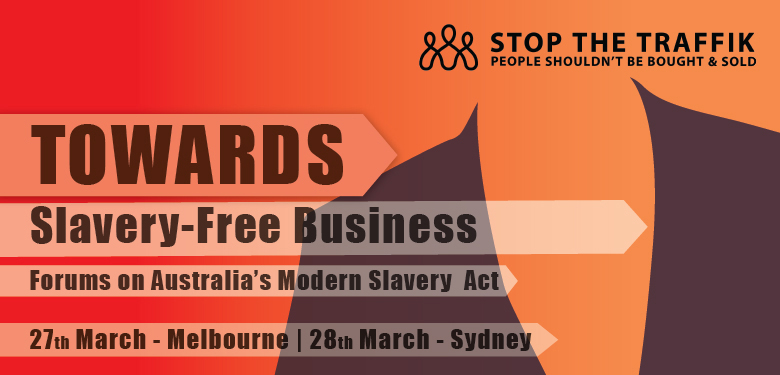Promotion: Towards Slavery-Free Business – Forums on Australia’s Modern Slavery Act
Only a few weeks into the new year, Australia has faced several significant events closely intertwined with core themes that underpin sustainability: trust, culture, ethics, transparency and governance, with the final report from the Royal Commission into Misconduct in the Banking, Superannuation and Financial Services Industry, the country’s recent spate of extreme weather events and civil society’s (and business) call for stronger government action on climate change, the ongoing political battle regarding Australia’s refugee crisis, and the list continues.
As Australia debates and works through difficult solutions for these real challenges, there is on the other hand a massive opportunity for the country to learn from how others have done and capitalize on people’s (largely) genuine desire (and enabling culture) to want to do things better, to want to do the right thing. The recently enacted Australian Modern Slavery Act for example is often cited as a more robust version of the UK Modern Slavery Act.
Highlights of the Australian Modern Slavery Act
- The Act was passed by the Parliament on 29 November 2018, an electronic copy of the legislation can be accessed here. This Commonwealth law came after the state New South Wales (NSW), which introduced its Modern Slavery Act in August 2018.
- Requirements of the Act: A summary factsheet of the Act by the Department of Home Affairs can be found here. Some key features of the Act include – Mandatory reporting criteria requiring reporting entities to provide information about their structure, operations and supply chains; potential modern slavery risks; actions taken to assess and address these risks; and how they assess the effectiveness of their actions. A reporting threshold of AUD$100 million annual consolidated revenue. This threshold will cover approximately 3,000 entities, including the Australian Government who will lead by example by publishing an annual consolidated statement covering Commonwealth procurement.
- Development of guidance material: Since the passing of the Act, the Department of Home Affairs (implementing agency for the Act) has worked with a business and civil society drafting group to develop detailed draft guidance and how to comply. This guidance will be shortly released for public consultation.
- Timeframes for reporting: The Act requires reporting entities to prepare annual statements covering the reporting entity’s twelve month reporting period. A reporting entity’s reporting period means that entity’s financial year or other annual twelve-month accounting period used by that entity. For example, if a reporting entity operates on an Australian Financial Year, its reporting period will be 1 July to 30 June of the following year. If a reporting entity operates on a calendar year, its reporting period will be 1 January to 31 December.
- Entities are required to begin reporting on their first full reporting period after 1 January 2019. The first reporting period for entities operating on an Australian Financial Year will be 1 July 2019 to 30 June 2020. The first reporting period for entities operating on a calendar year will be 1 January 2020 to 31 December 2020. Reporting entities operating on other 12 month accounting periods can seek clarification from the Department about their reporting deadlines.
As most are expected to report very shortly on (part of) their 2019 activities, to help companies navigate this journey – ELEVATE is partnering with Stop the TRAFFIK Australia for two forums in Melbourne and Sydney in March 2019 to equip companies with information, company case studies and relevant practical tools to respond effectively to the newly enacted legislation. The Department of Home Affairs will also be launching the final version of the Guidance material at the forums. Join us in March. “The Modern Slavery Act has the potential to impact the lives of millions of people caught in slavery in supply chains. This Business Forum will bring together resources and conversation to support business in leading the future for eradicating slavery.”
ELEVATE’s Strategic Partners are entitled an additional 10% discount to attend these forums. For more information about these forums, please see here or contact ELEVATE’s Sydney-based director, Mabel Wong, at mwong@elevatelimited.com.
